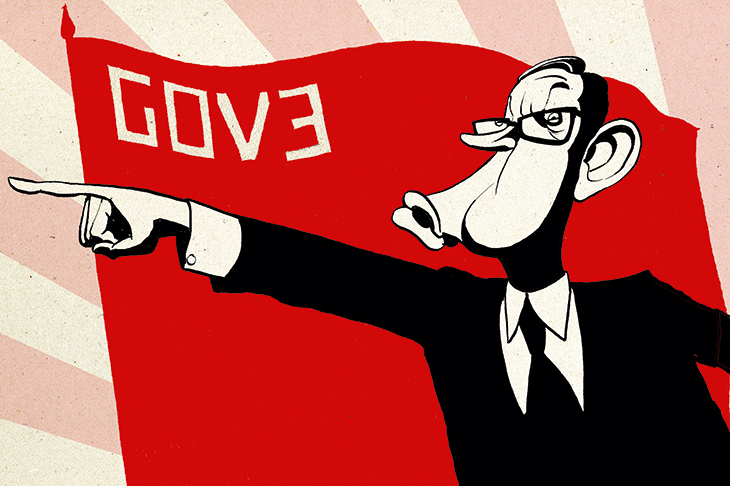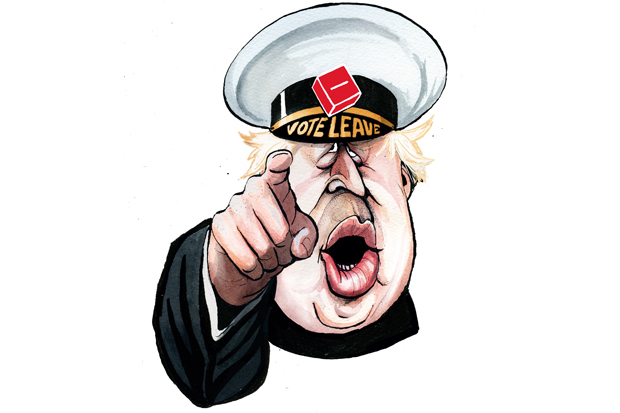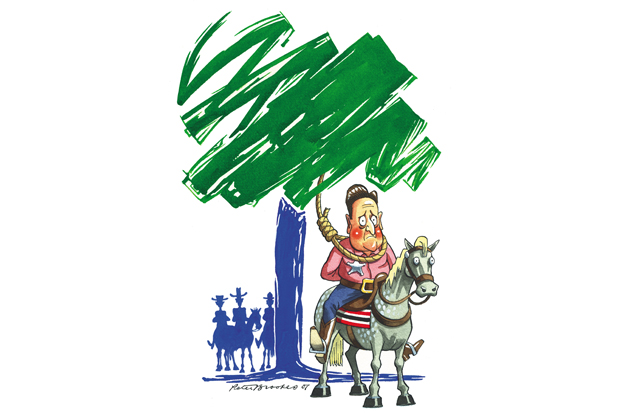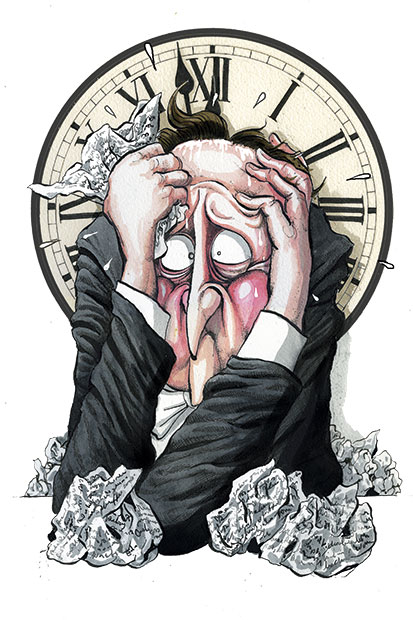Michael Gove stands in front of an empty throne in the magnificent Cabinet Office room. George III was the last monarch to use it and there it has stayed, beneath his portrait. For a second, it looks like Gove is about to sit in it and grant us an audience, but he’s only leaning over to show off the royal crest.
At the other end of the room stands a large television which, a few hours before we meet, was used by Gove and other ministers to watch Tuesday’s Supreme Court ruling. From the madness of King George III, to the humiliation of Boris Johnson.
As the minister in charge of no-deal planning, it’s Michael Gove’s job to tell everyone that — in spite of everything — Britain really is leaving the European Union on 31 October. Why should anyone believe him? ‘Everyone knows that we have a Prime Minister who is committed to leaving on that date,’ he says. Maybe so but, to paraphrase one of his fellow Scots, the best-laid Brexit plans go aft agley. What are the chances, now, that this deadline will be honoured? ‘That’s what we’re going to do,’ he says. But a 50 per cent chance? A 90 per cent chance? ‘That’s what we’re going to do.’
When he was Environment Secretary under Theresa May, Gove was very wary about no deal. Now he sounds more confident. He doesn’t say that we’re ready, just that ‘we are getting readier every day’. He has a statistic: ‘98.5 per cent of our trade with Europe by value comes from companies that are already prepared or 3,000 significant companies that have the resources we believe to be in a decent position.’ He praises the French for their preparations, too. ‘To their credit, they have a specific border inspection post for seafood in Boulogne so that if you are carrying shellfish or salmon for sale in France, there will be a special dedicated route. So you will arrive in Boulogne, your goods will be inspected and something that’s caught in Peterhead on Tuesday can be on sale in France on Wednesday morning.’
Even if Britain leaves without a deal and defaults to World Trading Organisation rules — which would mean an export tariff averaging about 4 per cent — he doesn’t believe this will last. ‘I don’t think anyone thinks that we will be trading on WTO terms with the EU for ever. If we leave, the basis on which we continue talking to the EU changes. But we will continue talking to them, in order to ensure that we can get the best possible trading arrangements for this country and for businesses within it.’ In other words, the Brexit talks would continue long after Brexit.
Parliament, of course, has passed a law instructing the government to ask for an extension of EU membership if no deal is agreed. He’s not worried. ‘I think that no letter is going to be sent because I am confident that we will be in a position where we have a deal,’ he says. The EU, he believes, can see that even a second referendum wouldn’t change things. ‘It is overwhelmingly likely that you would have a bigger Leave vote. People would think they hadn’t been listened to the first time, which would make life more difficult for the EU. So I think it would look to a Withdrawal Agreement concluded and then a future partnership which allows for trade and security co-operation.’ Even if the country did vote to Remain, Gove still thinks ‘the EU wouldn’t want us in if we had another narrow result… I think that would be a fundamentally unstable situation.’
We know from David Cameron’s memoirs that Gove argued against a referendum, saying it would start — rather than conclude — a bitter argument. ‘We promised a referendum before we knew what the question was really going to be. Remain or Leave, yes: but Remain on what basis?’ Once his advice was ignored and the referendum pursued, he says, he had to campaign for Leave, even if this would set him against his old friend. In his memoirs, Cameron portrays this as betrayal. Even now, Gove is not sure why.
‘David was very clear: he always knew I was a strong Eurosceptic,’ he says. ‘He hoped that loyalty to him would mean that I would bury that.’ In his memoirs, Cameron denounces Gove for treachery and turning into a ‘foam-flecked Faragist’. But Gove, ever the gent, has nothing but praise for his former boss. ‘If you look at his record and you look at his book in the round, anyone would think: well, he was a bloody good prime minister,’ he says. ‘People will feel a mixture of admiration and sympathy for the position he found himself in.’
So if Cameron is ‘bloody good’ then how would he describe Boris Johnson, a man he famously declared to be unsuited to the job? ‘A superb Prime Minister,’ he says. ‘Fundamentally, he is a liberal Conservative and also a Eurosceptic. There are a significant number of people in the Conservative party, particularly in the rising generation, that take that view.’ He sees this as the new Tory mainstream. ‘You can call it liberal progressive, One Nation: all these terms I think are inadequate. It’s a generous-hearted vision of where the country should be.’
But so far, have things gone well — or not so well? It’s hard to say, he replies. ‘If you judge Chelsea’s performance on the very first match of the season where they lost to Manchester United, you’d have thought: hmm. But you’d have seen since then Frank Lampard assemble a new team with one or two older figures, but lots of new young talent, that has every chance of doing incredibly well.’
And if things do go wrong (-bookmakers think it’s 50/50 whether Johnson will be in No. 10 by Christmas), would Gove rule out having a third tilt at the top job? ‘No, I am not planning to stand again,’ he says, a little too quickly. ‘I’m planning to support the Prime Minister.’ As a former journalist, he’ll know the I-have-no-plans verbal formula rules nothing out. But he’s keeping his head down in general (this is his first print interview since taking the job), and even before parliament was un-prorogued, Gove was only planning to make the briefest of appearances at Conservative conference.
Will these Brexit wounds ever heal? He points to his time as environment secretary where, he says, he won over his environmentalist critics. ‘People like George Monbiot — who, of course, is passionately opposed to a lot of what this government is doing — is a Remainer. But at the same time he was generous–spirited about what we are trying to do on the Common Agricultural Policy and the environment. I think it’s in that spirit that conversations should take place,’ he says. If the Tories can win over the moonbat (as Monbiot is affectionately known), they can do anything.
But nothing will be resolved, he says, without a new parliament. ‘I think that the case for a general election — not that I wanted one — has grown stronger and stronger with every day that passes.’ Gove admits that he isn’t looking forward to another poll but that it is ‘something that has become inevitable’. Next week in Manchester will tell us how ready the Tories are for that election.
Got something to add? Join the discussion and comment below.
Get 10 issues for just $10
Subscribe to The Spectator Australia today for the next 10 magazine issues, plus full online access, for just $10.
You might disagree with half of it, but you’ll enjoy reading all of it. Try your first month for free, then just $2 a week for the remainder of your first year.














Comments
Don't miss out
Join the conversation with other Spectator Australia readers. Subscribe to leave a comment.
SUBSCRIBEAlready a subscriber? Log in